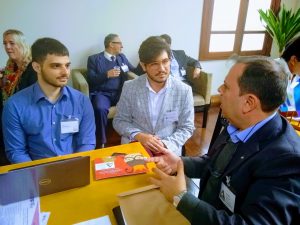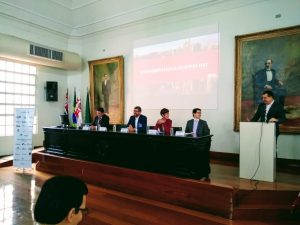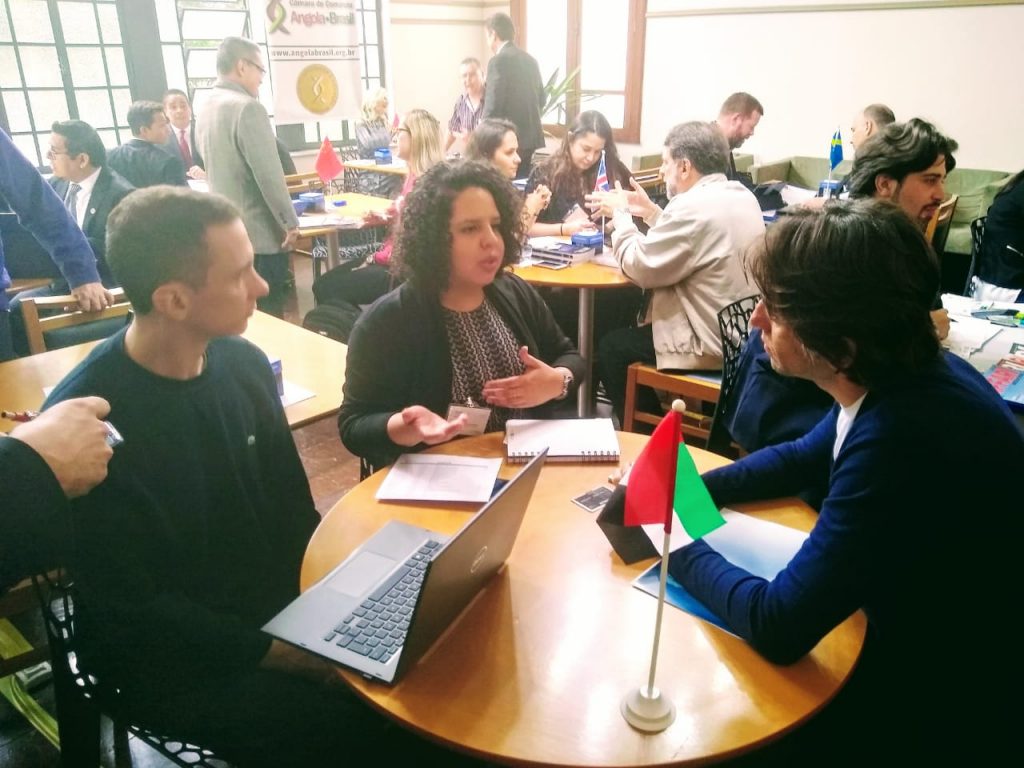São Paulo – The plans of São Paulo-based companies that are beginning to export or plan to do so soon include selling to Arab countries. So said most of the businesspeople attending the 2nd SP International Business Day, an export-oriented event taking place this Monday (21) at Fundação Escola de Comércio Álvares Penteado (Fecap)’s Palácio do Comércio building. The event is hosted by SP Negócios, the municipality’s export and investment promotion agency.
This interest in Arab markets became clear as the businesspeople sat down for meetings with chambers of commerce, embassies and consulates – including the Arab Brazilian Chamber of Commerce. These so-called market intelligence sessions are part of the event’s schedule – SP Negócios matched the needs of businesses that registered for the event with entities from each prospective target country.
Each chamber or diplomatic representation had their own area in which to welcome visitors, and the Arab Chamber was much sought-after – as were all organizations present. The Arab Chamber had meetings with executives both from companies that already export and others that intend to begin.

Arab Chamber Market Intelligence manager Ana Becker said the companies that sought out the organization during the event are already aware of Arab countries, but their view is too Dubai, UAE-centric. According to her, not everyone knows the full breadth and diversity of the Arab world, and the potential of some of its countries as gateways to other markets, like Egypt is to Africa.
The Arab Chamber was contacted by companies from industries including commodities, fertilizers, açaí, landscaping, décor items, cosmetics, railway parts and perfumes that were looking to sell to Arab countries. These companies’ executives wanted to find out about actions designed to unlock the Arab market, like missions and fairs in Arab countries.
Arab Chamber commercial assistant Steffani de Novais, who spoke with the executives at the SP Negócios event, contact will be made with these enterprises after the fact. The Chamber will let them know about an array of actions that the organization can take for accessing Arab markets, including market studies and promotion.
“It’s time for these companies to expand and show their work, and this can be done in Arab countries,” said Becker. Besides the Arab Brazilian Chamber, delegates were in attendance from Angola, Canada, United States, Paraguay, Uruguay, United Kingdom, Japan, Costa Rica, China, India, Italy, Luxemburg, the Mercosur and Mexico.

There are currently about 20,000 exporting companies in Brazil. The number was mentioned during the 2nd SP International Business Day, whose goal is precisely to increase that number, especially in the São Paulo municipality. After the event’s opening, exporting businesses’ success stories were told, and then group mentoring was offered to companies that are starting out in international sales.
“My message to you is enjoy the day today. Networking is the essence of everything. I always tell this to my kids: networking, networking, networking,” said SP Negócios president Juan Quirós during the opening, stressing how important it is to pay attention to people. “Tomorrow, one of these people will be a bridge to opportunity,” said Quirós.
Right after the opening, Spain-based Roca’s director for Brazil, Maria Lucia Besson, told the story of the company’s international expansion. On entering Brazil, Roca bought out local sanitaryware brands Logasa, Celite and Incepa with plans to wipe them out and establish itself alone. After finding out that Roca wasn’t known to Brazilian buyers, it reviewed its strategy and not only kept the local brands active but took them into other countries it expanded into.

Maria Lucia said this was the right decision to make, and it defined the company’s existence in Brazil. Roca makes all sorts of sanitaryware, from ceramic tiles and porcelain to metals and fittings. The Roca and Laufen brands target the high-end and super-high-end markets; the other ones are more affordable. The company has 11 manufacturing plants in Brazil and ships product across the Americas, from Canada on down, as well as part of Africa.
Another company that got its story told was Itamaraty, a biscuit and wafer maker best known for its Look sticks. Export manager Nancy Gonzales spoke with a group of executives, in one of the conversations followed by mentoring, going into the peculiarities of biscuit exports.
Nancy discussed the advantages that exporting brings, like strengthening a brand even domestically, and the fact that Brazilian product is well regarded in most international markets. She also mentioned challenges, like different ingredient requirements, the need to diversify so as not to rely on one or a few countries, exchange rate fluctuations, and the international scenario.
The event saw SP Negócios enter into a technical cooperation agreement with Banco do Brasil. It should enable companies to get support from Banco do Brasil in seeking out export financing, as well as export training from SP Negócios.
Translated by Gabriel Pomerancblum




